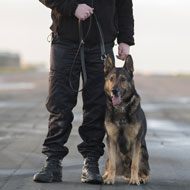
New bill to toughen up on those who attack police animals
Service animals including police dogs and horses will be offered greater protection, under a new law being backed by the government.
The Animal Welfare (Service Animals) Bill aims to close a loophole in the law, which allows those who harm service animals to claim self defence. The bill has been published in parliament and is scheduled for a second reading today (15 June).
Under the Animal Welfare Act 2006, defendants accused of causing unnecessary suffering to an animal can claim they were protecting themselves, and justified in using physical force against a service animal.
Proposed changes to the law were prompted by a high profile campaign for ‘Finn’s Law’, which calls for police animals to be given equal status to human police officers when they are injured in the line of duty. Current legislation treats service animals as property.
The campaign was launched after police dog Finn was stabbed while chasing a suspect with his handler, PC Dave Wardell. Finn required life-saving surgery for injuries to his head and chest, involving several vital organs, while his handler sustained a stab wound to his hand. The defendant was charged with actual bodily harm for injuring PC Wardell, but only criminal damage for harming Finn.
Announcing the government’s support for Finn’s Law, environment secretary Michael Gove said: “This Bill will offer stronger protection for the many brave service animals that help to protect us. I pay tribute to PC David Wardell, Sir Oliver [Heald] and all those who have campaigned for Finn’s Law.
“This Government is continuing to raise the bar on animal welfare, whether it be for our beloved pets, brave service animals or on farms.”
The government also recently announced it would increase maximum sentences for animal abusers to five years in jail.
Finn’s handler, PC Wardell, welcomed the new bill:
“My boy Finn, now retired, was one of several thousand service animals that work to protect the whole of society 24 hours a day, everyday. When Finn was seriously injured it didn’t seem right to me or the public that he was seen as an inanimate object/property, in law.
“This campaign and Bill is my way of saying thank you to Finn for saving my life and to the many others for the truly outstanding and brave work they do everyday.”
Image courtesy of Hertfordshire Police



 The RCVS has announced a new version of its 1CPD mobile app, with enhanced features for veterinary surgeons and veterinary nurses to record their continuing professional development.
The RCVS has announced a new version of its 1CPD mobile app, with enhanced features for veterinary surgeons and veterinary nurses to record their continuing professional development.